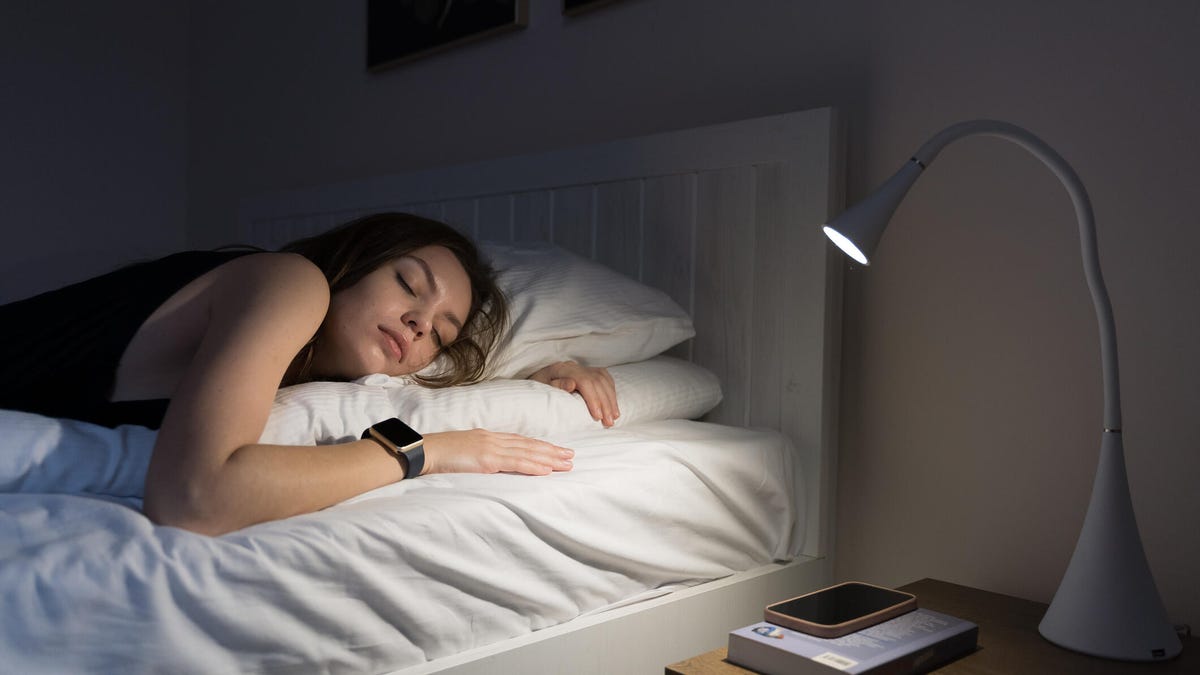6 Ways to Use Technology for Better Sleep Tonight

Sacrificing sleep is out, and prioritizing your z’s is in — but the importance of good sleep isn’t a passing trend.
Adequate sleep is the foundation of optimal health. This is why the global sleep market, including sleep technology and other sleep products and services connected to sleeping, has climbed over 100 billion dollars in the past four years. Because who doesn’t want better sleep, right?
We dug into the research on sleep tech to find the best sleep devices to help you sleep and live well.
What is sleep tech?
Sleep technology includes gadgets and apps designed to track, improve and promote healthy sleeping habits — also called good sleep hygiene.
When it comes to sleep tech gadgets, there’s a little something for everyone, from wearables to non-wearable trackers, smart sleep masks, blue-light blocking glasses, smart beds and more.
6 best types of sleep devices
When it comes to sleep tech gadgets, there are so many choices it can be overwhelming to decide where to start. Here are our top six picks for the best types of sleep devices to add to your bedtime routine.
Sleep apps
Whether you’re looking for something to help you relax into a peaceful sleep, cognitive behavioral therapy programs for sleep improvement, or just sleep data, there’s an app for that. Sleep apps are convenient, non-intrusive and affordable tools if you already have a mobile device.
Sleep apps such as Headspace, Calm and Sleep Reset offer meditation and breathing programs, stretching and even bedtime stories. The Oura Ring offers built-in monitors that track sleep data with the added bonus of activity, heart rate and body temperature tracking.
Apps such as Sleepio use Cognitive Behavioral Therapy techniques to help improve sleep.
Wearable sleep trackers
Do you ever wake up and feel like you should be rejuvenated, but instead you just don’t feel rested?
Sleep trackers use various metrics to track sleep, including heart rate, oxygen levels and physical movement. This data can help you identify patterns in your sleep habits or disturbances that may interfere with your sleep cycles. Most sleep-tracking devices can be worn during your awake time, too, to track other metrics such as physical activity.
Since something you wear on your body could interfere with your comfort, there are options. The Oura Ring Gen3 is a sleep device you wear on your finger and is great for light sleepers who don’t want to be disturbed by a bigger device worn elsewhere.
For those who prefer a wrist sleep device, the FitBit Inspire 3 is a wristband. There are also chest strap sleep gadgets like the Biostrap Active Set.
Sunrise alarms clocks
Unless you prefer to be startled awake by a loud and blaring alarm clock, sunrise alarm clocks can make waking up much more pleasant. The best sunrise alarm clocks emit light to imitate the sunshine sneaking into your room at sunrise. They can also make various relaxing sounds. The Hatch Restore 2 offers a number of different light color and sound options.
Although they’re called sunrise alarm clocks, you can also use these in your bedtime routine. One of our writers enjoys using the Hatch Restore 2‘s cozy campfire sound at night, for example, to wind down. Many of these alarm clocks come with additional feature options (some of which require membership) like affirmations, wind-down routines and more.
Smart sleep masks
Depending on your living situation or whether you travel frequently, sleeping in a totally blacked-out room may only sometimes be an option. We’ve all seen the traditional sleep masks, but did you know there are benefits to sleep masks beyond just better sleep, like better brain function?
Now you can get smart sleep masks that take sleep masking to the next level by providing the benefits of traditional sleep masks and then some. Smart sleep masks, like Somalytics SomeSleep provide the black-out experience but also use sensors to track eye movements, which helps to explain sleep quality.
Sleep disorder aids
Most of the time, when we hear the words “sleep aid,” we think of over-the-counter or prescription medications we can get to help us when we have a problem getting good sleep. But there is sleep aid technology that may treat the problem causing you not to sleep well instead of just treating the symptom.
One common sleep aid technology is a continuous positive airway pressure device. CPAP devices are used to treat a condition called sleep apnea, which disrupts breathing as you sleep and often results in fatigue and other unfavorable symptoms. Sleep apnea affects around 22 million Americans. The CPAP device keeps breathing disruptions from happening and can leave you feeling much more rested when you wake. There are a variety of different CPAP devices to suit different comfort levels.
The Inspire implant for sleep apnea is an alternative to a traditional CPAP machine and eliminates the discomfort and obtrusiveness commonly associated with traditional machines.
White noise machines
Whether from a box fan or a humming air conditioner, many of us are accustomed to sleeping with consistent noise that helps block out other sounds or dull the sound of silence. White noise machines are a great way to ensure consistent and non-disturbing sound.
There are many white noise machine options on the market, and many offer pink noise, brown noise and others in addition to white noise. They also offer additional features your box fan doesn’t, including spa and nature sounds, easy portability, volume options and even nightlight options.
Benefits of sleep technology
Sleep technology is an entire industry dedicated to improving sleep because sleep is that important. The breadth of sleep technology options available today ensures there is something for everyone. Here are some benefits of sleep technology to consider if you’re searching for a better night’s sleep.
Sleep technology can:
- Help you wind down and relax before bed.
- Help you establish a consistent bedtime routine.
- Treat disorders like sleep apnea so you can get better sleep.
- Provide a peaceful waking-up routine that works with your circadian rhythm.
- Track various sleep metrics and provide data to help you pinpoint areas of sleep improvement.
Source: CNET














